In this article we provide a summary of Biogas Additives which are offered to AD Plant operators. This is all about improving Digester Biology in Anaerobic Digestion Plants for higher biogas yield and greater digester resilience against loss of biogas production when the anaerobic digestion process becomes stressed.
Some industry experts have in the past been highly skeptical about the value of additives. If that's you read right to the end!
Enhancing Anaerobic Digestion: A Guide to Biogas Additives
 Biogas production through anaerobic digestion is a vital component of sustainable energy. To optimize this process, a variety of biogas additives are available to AD plant operators. These additives play a crucial role in improving digester biology, thus enhancing biogas yield and ensuring greater resilience against disruptions in the anaerobic digestion process.
Biogas production through anaerobic digestion is a vital component of sustainable energy. To optimize this process, a variety of biogas additives are available to AD plant operators. These additives play a crucial role in improving digester biology, thus enhancing biogas yield and ensuring greater resilience against disruptions in the anaerobic digestion process.
Types of Biogas Additives for Improved Digester Biology
With an array of products on the market, it's important to understand the types of biogas additives available and their potential benefits:
- Trace Element Supplements: These additives compensate for deficits in essential trace elements needed for the metabolic activities of anaerobic microorganisms.
- Enzyme Enhancers: Enzymatic additives accelerate the breakdown of complex organic matter, facilitating faster biogas production.
- Buffering Agents: These additives help maintain optimal pH levels within the digester, preventing acidification that can hinder biogas production.
- Antifoaming Agents: To prevent foam formation that can cause operational issues, these additives reduce surface tension and improve the stability of the digestion process.
- Microbial Cultures: Specific strains of bacteria or archaea can be added to enhance the biological activity and efficiency of the digestion process.
The Complex Process of Biogas Formation
 The conversion of biomass to biogas involves a series of biochemical reactions, influenced by a multitude of variables.
The conversion of biomass to biogas involves a series of biochemical reactions, influenced by a multitude of variables.
Factors such as temperature, pH, nutrient availability, and feedstock composition can significantly impact the efficiency and stability of biogas production.
Understanding Variability in Additive Effectiveness
“The effectiveness of any biogas additive will vary from biogas digester to biogas digester,”
explains a leading biogas expert. Due to this variability, it is crucial for plant operators to conduct trials to assess the suitability and benefits of specific additives.
for their own biogas plants. These trials help determine whether the addition of certain biogas additives can lead to an improvement in plant performance.
Cost-Benefit Analysis of Biogas Additives
 It's not just about performance gains. Operators need to weigh the benefits against the costs associated with using biogas additives. “Even if performance gains are found, it is necessary to check that the benefit will outweigh the cost of dosing a biogas additive,” states another industry expert. This cost-benefit analysis ensures that the use of additives is economically viable and sustainable in the long run.
It's not just about performance gains. Operators need to weigh the benefits against the costs associated with using biogas additives. “Even if performance gains are found, it is necessary to check that the benefit will outweigh the cost of dosing a biogas additive,” states another industry expert. This cost-benefit analysis ensures that the use of additives is economically viable and sustainable in the long run.
Market Demand and the Need for Research
In Germany alone, the existence of over 250 biogas additives on the market reflects the growing demand for optimization in biogas plants. However, the effectiveness of these additives varies and requires extensive research to validate their benefits.
The Challenge of Evaluating Additive Effects
“The effects of these additives are hardly yet investigated and can only be evaluated by costly, time-consuming tests,”
remarks a biogas researcher.
 Continuous pilot scale anaerobic digestion experiments (assays) are necessary to accurately assess the impact of different additives on biogas production. This highlights the need for more research and development in this field to better understand and maximize the potential of biogas additives.
Continuous pilot scale anaerobic digestion experiments (assays) are necessary to accurately assess the impact of different additives on biogas production. This highlights the need for more research and development in this field to better understand and maximize the potential of biogas additives.
Conclusion: The Future of Biogas Additives in Anaerobic Digestion
As the demand for renewable energy sources continues to grow, the role of biogas additives in enhancing the efficiency and stability of anaerobic digestion systems becomes increasingly significant. The future of biogas production lies in the continuous exploration and development of these additives, alongside thorough research to validate their effectiveness. With the right approach and investment in research, biogas additives have the potential to revolutionize the anaerobic digestion process, leading to higher biogas yields and more sustainable energy production.
Key Takeaways for AD Plant Operators
- Conduct trials to assess the effectiveness of biogas additives for your specific plant conditions.
- Perform a cost-benefit analysis to ensure the economic viability of using additives.
- Stay informed about new developments and research in the field of biogas additives.
- Collaborate with industry experts and researchers to optimize the use of additives in your biogas plant.
As the anaerobic digestion industry continues to evolve, embracing innovative solutions and research will be key to unlocking the full potential of biogas as a renewable energy source.
Many biogas experts agree that the stability of biogas production, and production rate, can indeed be greatly improved by keeping these parameters close to their optimum. One possibility to achieve this is by use of additives.
List of Additives Products for Optimizing Biogas Production
A Company Called “Biogas Additives” Offers Biogas Additives to Maximise Performance at AD Plants
Assuming for a moment that you accept the hypothesis that the performance efficiency of your biogas plant is closely dependent on the fermenter biology which can be improved by using biogas additives.
The highest possible yield can only be achieved through establishing a close to perfect fermentation process, with the best culture of bacteria species, and other micro-organisms. Now, biogas additives can help, in the words of http://biogasadditives.co.uk:
1. Agri Flex Trace elements for greater biogas yield
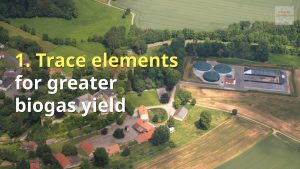
Agri Flex is a custom-made additive, containing trace elements and micro-nutrients which can improve methane yield by up to 30 per cent. After analysing the contents of your fermenter (usually every three months) they offer to design and formulate a specific mixture tailored to the particular needs of your own biogas plant. This additive, available as a powder. It, according to the supplier, stabilises the anaerobic biological processes so acidification is avoided. When this occurs, less substrate is needed for a given amount of biogas production. Gas output is improved thereby maximising profit.
2. Agri SOS First aid for your biogas plant
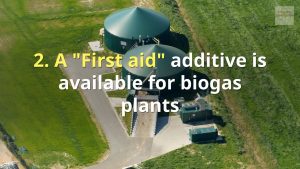 Agri SOS, available as a powder, is their first aid for your biogas plant. It contains all the required trace elements to ensure a reduction in high acidity. Its use will avoid a rapid collapse in biogas production and will save you the costly task of restarting the plant. For long-term stabilisation of the biological processes they recommend their individual trace element mixture, Agri Flex.
Agri SOS, available as a powder, is their first aid for your biogas plant. It contains all the required trace elements to ensure a reduction in high acidity. Its use will avoid a rapid collapse in biogas production and will save you the costly task of restarting the plant. For long-term stabilisation of the biological processes they recommend their individual trace element mixture, Agri Flex.
3. Agri Visco
With the use of Agri Visco the biogas can rise more easily through the substrate and the substrate digestion is also improved.
- Reduces substrata viscosity
- Cuts energy consumption
- Easier mixing and pumping
- Better release of biogas
4. Optimises viscosity in your fermenter
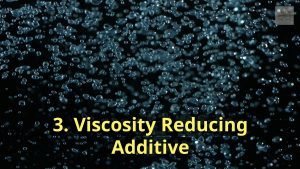 Agri Visco is a selected combination of different enzymes which can reduce the viscosity of the substrate in your digester. Some raw materials contain high levels of carbohydrates, such as starch, protein and polymer substrate fibres. These materials withhold water, increasing the viscosity in the fermenter thus causing mixing and pumping problems. High viscosity also results in higher energy consumption for mixing, resulting in methane having greater difficulty in passing through the substrate.
Agri Visco is a selected combination of different enzymes which can reduce the viscosity of the substrate in your digester. Some raw materials contain high levels of carbohydrates, such as starch, protein and polymer substrate fibres. These materials withhold water, increasing the viscosity in the fermenter thus causing mixing and pumping problems. High viscosity also results in higher energy consumption for mixing, resulting in methane having greater difficulty in passing through the substrate.
5. Agri Combi – A bespoke combination of trace elements and enzymes to suit your fermenter
Low microbiological activity can threaten stable processing and lead to significant reductions in production and yield. Agri Combi helps maintain an optimum supply of micro-nutrients because we individually tailor a combination of trace elements and enzymes to the needs of your fermenter. Agri Combi allows faster and more complete digestion of fibre-rich substrate components while the use of enzymes optimises the fermentation process increasing gas yield. A concomitant reduction in viscosity significantly reduces the energy needed to operate the agitators and pumps. via Biogas Additives | Renewable Energy Additives
6. Performance enhancement by using additives, especially the trace element supplementation from BioGAS+
Beyond the use of machinery, the use of additives is the alternative – or complementary – way of optimising an anaerobic digestion process.
The use of additives has become an important topic due to their capacity to increase reactors performance in terms of process stability, biogas production and treatment capacity. Research experiences also showed that additives could lead to inhibitory phenomena.
Regarding inorganic additives, Co, Fe and Ni are the most investigated nutrients. Other reported inorganic additives comprise substances able to mitigate ammonia nitrogen inhibition and/or to immobilise anaerobic biomass.
Regarding biological additives, results clearly indicate that bio-augmentation might be a useful tool to improve digester performance: especially when the digester is subjected to stress conditions (e.g. start-up, inhibitory concentrations). However, its application in full-scale plants is still scarce due to its economic uncertainties and risks.” via Additives – BioGAS+
The nanotechnology solution offered by BioGAS+
In this context, the effect of nano biogas additives can improve the anaerobic digestion process and consequently on the biogas yield is an active area of research and the most promising
The pioneering biogas additives solution from nanotechnology is BioGAS+ by Applied Nanoparticles.
There was a clear need for a unified, standard and efficient solution for the optimisation of anaerobic digestion. Applied Nanoparticles offers the trace element supplementation BioGAS+, a nanotechnology-based innovation that obtains the highest ever-reported improvement of biogas production. BioGAS+ claims that they can triple the biogas yield and offers all this other benefits for process optimisation: via Additives – BioGAS+
7. Zorg Biogas AG – Sells Enzymes for biogas
A mixture of enzymes is offered by a well-known and well-established biogas company called Zorg Biogas AG. Their product is based on probiotics and microelements, we are told. It is an additive used for biogas yield increase. Zorg says that additives achieve considerable results at low cost. The main advantages of enzymes application are the increase of biogas yield from 25 to 40% without any changes in digester lant design, stability of the process and increase of methane content in the biogas.
Thanks to enzymes it is possible to get almost all the biogas out of the main digesters without a post-digesting stage. Biogas plant [construction] size/ cost can be halved with the additive. The Enzyme additive has been applied already for 4 years in 100 biogas plants and gives guaranteed increases of biogas yield from 10 to 40%. An example of this is a biogas plant where the biogas yield is 260 m3/t of corn silage is reached, that is 45% yield increase. The daily consumption for 1 MW biogas plant is 1 to 2 kg. via Zorg Biogas AG
8. Silage Additives from Biogas | ADDCON – Green Chemistry
“Stable maize silage with high energy content is the foundation for success”
, company representative.
During the preparation of silages for biogas, it is vital to preserve nutrients. This means that the aim is to have lowest possible preservation losses, and a perfect hygienic condition of the end product. Nutrients, that are lost between silo and fermenter, have cost money during the cultivation and harvesting period already. Preserving these nutrients saves money and justifies technological effort. via Biogas | ADDCON – Green Chemistry
For biogas plants fed with purpose grown crops making good silage is vital to their profitability. More biogas per tonne of material and minimised storage losses increases efficiency per hectare.
Firstly you need to select the right seed variety to suit your location and requirements. We can offer an extensive range of seeds through our Forage and Arable division.
Once the crop is grown you need to ensure it is preserved correctly to minimise energy losses. That's where biogas additives are used.
9. Silasil Energy
Silasil Energy is a biogas specific silage additive manufactured by Schaumann BioEnergy. Silasil Energy has been approved by the DLG (German Agricultural Society) as increasing methane yield and improving aerobic stability. via Silage Additives | ForFarmers UK
10. Biogas – Antifoams – Schill + Seilacher “Struktol” GmbH
Antifoam additives have been used throughout the wastewater treatment industry when needed, for probably at least the last 50 years.
Foaming can occur whenever biogas is produced during the anaerobic digestion of organic material. It is normally seen when the fermentation process is not running well, and the fermentation organisms are stressed. The need to dose should be short-lived if the plant operator finds and corrects for the chemical imbalance that causes foaming. Substrates are specifically grown energy plants like maize, previously unused parts of plants, liquid manure, wastewater sludge and other bio-waste. The organic material is biodegraded by microorganisms into biogas. In many cases the organic material also contains foam-active substances like proteins which are involved in foam production.
During digestion disturbing foam can occur. It happens if the process in not correctly driven and “foam active” substances (biogas additives) are present: inside the digester, during the isolation of the biogas from the digestion substrate, during the digestate evaporation etc.
Struktol antifoaming agents are well-balanced between destruction of already built foam, and the prevention of more foam and the degassing of high viscous digester content. Biogas additives via Biogas – Antifoams
11. Tailor-made additives to optimise bioreactor environments from SwissBiogas.com
Biogas from anaerobic digestion (AD) with enhancing biogas additives, is rising in popularity. The AD industry is hoping biogas additives will help by holding a key-role, in the responsible management of the world’s limited resources.
12. EGx by SwissBiogas.com – High purity tailor-made additives, which optimise bioreactor environments:
- Remove Hydrogen Sulphides
- Increase Biogas and Methane Yields
- Reduce Odour Formation
- Address Struvite Formation
- Adhere to National Fertiliser Regulations.
EGx by SwissBiogas.com [allegedly] incorporates the latest research in the field, with the focus to substrate-independently raise the biogas volume and its methane concentration. SwissBiogas.com assists AD-plants in the implementation of a sustainable desulphurisation process, minimising their environmental footprint. via SwissBiogas.com
13. Raise Biogas Plant Efficiency with Lukeneder Iron Additive Dosing
Deuto-Clear® Sulfo removes hydrogen sulphide and ammonia gas from the substrate and adds biogas additives with nutritious trace elements and minerals to produce a healthy and productive environment for anaerobic bacteria.
- Fertiliser quality produced from the digestate, is improved by biogas additives and ammonium and sulphuric compounds are bound in the digestate.
- No longer necessary to dose fermenter with oxygen to convert H2S.
Protects Biogas Plant Equipment with Lower Maintenance Costs
By removing hydrogen sulphide from the raw biogas, Deuto-Clear® Sulfo avoids corrosion from oxidation of the engine and the exhaust gas heat-exchanger of a power plant, making it a better alternative to using oxygen to convert H2S. it's one of the Biogas Additives that boosts the nitrogen and sulphur content of the digestate – greatly improving agricultural productivity! The phosphoric content of the digestate also remains intact.
Furthermore, ammonia emissions are reduced when the fertiliser is spread on the fields, thus reducing total emissions of the biogas plant.
You can therefore prolong the intervals between oil and filter changes without violating the operating conditions of the manufacturers.
Installing expensive physical and chemical scrubbing systems is avoided because Deuto-Clear® Sulfo is said to effectively eliminate sulphur.
The product is also said to reduce ammonia in the raw biogas, thus preventing high temperatures in the engine and exhaust, avoiding wear and tear of the engine, and reducing NOx emission
The website states that the improved homogeneity of the biogas additives dosed sludge reduces wear and tear of spreading machines and the fertiliser just flows off the leaves of the plants preventing damage. The product also supports Feeding Biogas into the Natural Gas Grid. via Improving Biogas Plant Efficiency
14. Three Biogas Additives Tested – The Research Results
Anaerobic digestion (AD) converts biomass to biogas and many say that this process can be aided by using biogas additives. However, its performance is often affected by the nutrient condition of AD substrate.
In this study, a few substrate supplements were selected to promote the biogas production;
- MgO,
- FeCl3, and
- cellulase,
were selected based on the result from elemental analyses of the biomass. The potential impact of the additives on AD process was evaluated by performing a series of biochemical methane potential (BMP) tests.
BMP reactors with the substrate with one of the selected additives (i.e., MgO of 380 mg Mg L-1, FeCl3 of 88 mg Fe L-1 or cellulase of 25 mg L-1) exhibited higher microbial activity; 5–15% more biogas production was observed, compared to the blank.
Microbial community analysis showed that different additives resulted in proliferation of different microbial species. Therefore, it was decided to add the mixture of the three additives to the biomass.
Addition of the mixed additive resulted in 22% more gas production. Anaerobic digestion (AD) converts biomass to biogas, however, its performance is often affected by the nutrient condition of AD substrate. In this study, a number of biogas additives were tested… via Effects of supplement additives on anaerobic biogas …
15. Smallops Introduces OPS Additive: Claims to Boost Biogas Production by up to 20%
Smallops, a company operating in the Spanish renewable energy sector, has recently announced the development of an additive called OPS (Organic Particle Solution). This product, composed of carbon-encapsulated iron nanoparticles, is claimed to enhance biogas production in anaerobic digestion plants without modifying existing processes or adding other substrates.
Alleged Benefits of OPS Additive
According to Smallops, the OPS additive offers several potential advantages for biogas plants, including:
- Increased Methane Production: Smallops claims that the OPS additive can improve methane production by up to 20%, although independent verification of these figures is not provided.
- Cost Reduction: The company suggests that OPS could reduce production costs in line with the increase in biogas production, but the actual cost-effectiveness remains unconfirmed.
- Elimination of Hydrogen Sulfide Gas: Smallops states that OPS can reduce hydrogen sulfide gas by up to 99%, potentially extending the life of cogeneration engines. However, further evidence is needed to support this claim.
- Improved Degradation of Compounds: The additive is also said to increase the degradation of phytotoxic compounds such as polyphenols by 24%, but again, this is based on the company's internal data.
Impact on Soil and Plant Health: A Claim by Smallops
Smallops also asserts that the resulting digestate from using their additive is more beneficial when applied to soils, owing to higher iron and sulfur content and lower contaminant load. While this claim suggests an added value for the process, it lacks independent scientific validation.
Questioning the Stability and Quality of Biogas Production
The company promotes the idea that OPS provides greater stability to the biogas production process, leading to more consistent, higher quality, and maximized output. While this sounds promising, it remains important for potential users and industry observers to approach these claims with a degree of skepticism until they are substantiated by impartial studies or widespread practical application.
For more details about the OPS additive, Smallops encourages interested individuals
to visit their website at Smallops: Increase Biogas Production with OPS, although readers are advised to critically evaluate the information provided.
While Smallops' introduction of the OPS additive to the biogas industry is an intriguing development, the lack of independent verification of the product's claims necessitates caution.
As with all of these listed new additives, thorough independent testing and validation are crucial to confirm their effectiveness, reliability, and cost-efficiency.
Even More Biogas Additives!
- Germany – Development of a new enzyme product Axiase 100 – DSM Biogas
- Germany – Driving efficiency improvements through MethaPlus L100 enzyme – DSM Biogas via Success stories – European Biogas Association
Finally a Biogas Engine Additive!
OLOA® 46600 Landfill / Biomass / Digester Gas Additive
OLOA® 46600 high performance additive has been developed specifically for landfill/biomass/digester gas operations. It has received positive market feedback from OEMs, customers and end-users, even when tested in highly-loaded, late-model engines operating in severe landfill operations.
Gas engines working with renewable sources are very difficult to lubricate. Why?
- The gases differ in composition whether they are produced from sewage, agricultural waste, or sawmills (all landfills are different in composition)
- Biogas and landfill gases are essentially composed of methane and contain a lot of impurities like halogens, siloxane, and sulphur, which can harm gas engines. via OLOA® 46600 – Oronite
Are Biogas Additives Worth Looking at or are they Snake Oil? Conclusion
Anaerobic digestion is a worldwide technology for the treatment of organic waste streams with clear environmental benefits including generation of methane as renewable energy. However, the need to improve process feasibility of existing applications as well as to expand anaerobic digestion to a range of new substrates has raised interest on several additives as an intensification technique.
Among them are the supplementation of inorganic and biological additives. This has shown good results at improving digesters performance. via The role of additives on anaerobic digestion: A review
So, we consider biogas additives are worth looking at. They certainly do not deserve the “Snake Oil” description, if when fully tested at an AD plant, they are shown to work.
Additive dosing can be expensive and in a relatively new industry like the biogas industry, there is always the possibility that some treatments offered might as well be snake-oil and have no effect if not used in the right circumstances, at the right dosing rates, for the right reasons.
[First posted in February 2018.]


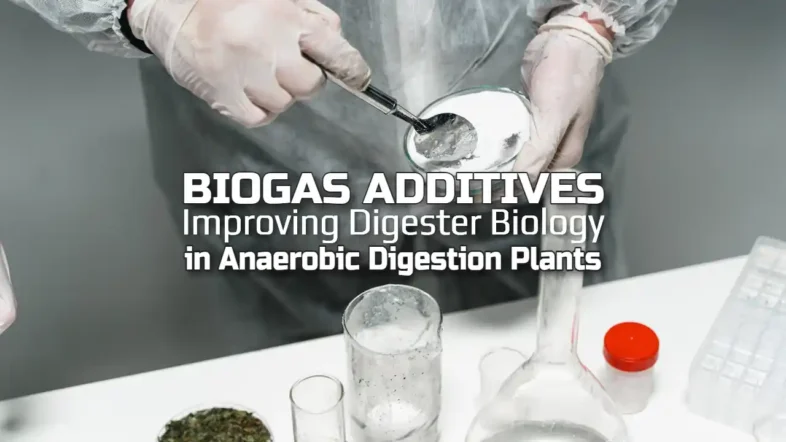
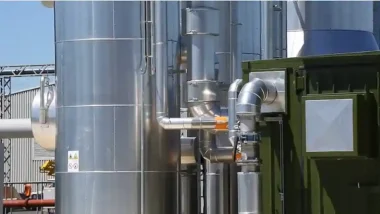
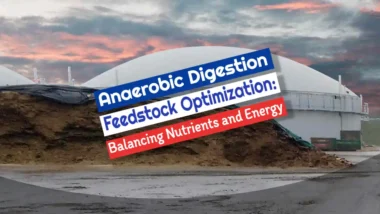


I needed to write for you this little note to lastly state thanks for the useful article pages you’ve added currently. It’s actually incredibly generous of individuals like you to provide without restriction all most people could have provided as an expensive ebook in making some bucks on their own. Even more so for this author thinking that you can easily have attempted it in instance you wanted. The motivating ideas additionally served as the excellent way to completely understand that individuals online have the identical passion much like mine to learn a little much more in relation to this condition. I make certain there are many more satisfying sessions in advance for people that do take a look at your blog.
Many thanks for your comments. I always enjoy reading a comment which shows appreciation of the work involved in creating posts like this one.
I think the admin of this page is working hard in to help his web page, I applaud it because here every page is quality based data.
I like this web site so much. Do you know that nobody else is writing about these biogas digester additives. Apart from the sellers of course.
bookmarked!!, I love your website!